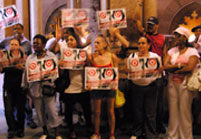Marching up and down the stairs of the New York State Capitol building in Albany on Monday afternoon, Myra Johnson was a woman on a mission. The 40-year-old HIV-positive rape survivor joined about two dozen other clients of the New York City-based Housing Works in a noisy but peaceful protest that ended outside the office of Governor Eliot Spitzer with this plea: Don’t back the bill pending in the state legislature this week that
would allow rape survivors to force their suspects to be tested for HIV. “AIDS care, not politics! Stop the bill now!” Johnson chanted, brandishing a sign featuring bright red Target-style bulls-eyes over the faces of Spitzer, who has expressed support for the bill, and Nettie Mayersohn (D-Queens), its chief sponsor. 
New Yorkers target rape testing bill
The forced testing bill (A.4861 A/S 3470), which passed 44-14 in the Senate last week and is slated to come to a vote in the Assembly by this coming Friday, June 22, is intended to protect rape survivors by letting them know if they may have been exposed to HIV. “The governor believes that a victim of a rape or a sexual assault needs to know as soon as possible the HIV status of their attacker,” Spitzer spokesman Paul Larrabee told the New York Times on May 24. “This information is critical to both the physical and emotional well-being of the victim.” Indeed. But those opposed to the bill suggest that all women who have been raped are better served by quick access to Post-Exposure Prophylaxis (PEP). PEP, a short course of antiretroviral medications, can prevent HIV infection if taken within hours of potential exposure (the CDC recommends starting within 72 hours but others say sooner is better). State senators recently rejected an amendment to the forced testing bill that would have greatly expanded PEP’s availability.
The problem with waiting to use a rape suspect’s HIV test result as an indicator of whether or not the rape survivor should commence PEP is that by the time the suspect is located, caught, correctly identified and tested, the time limit may be over—making it possibly too late for the woman to try to save her life.
Also, the test results could steer a woman to make the wrong decision. A suspect who tests HIV negative (or positive for that matter) may later turn out to be innocent—and thus the test result is meaningless to the rape survivor’s health. Worse, a suspect who tests HIV negative may be in the “window” period before seroconverting and may actually have exposed the woman to HIV. (Just because someone tests negative for HIV does not necessarily mean that they are not carrying the virus.)
The bill has drawn heavy criticism in recent weeks; critics say it emphasizes the HIV status of potential rapists more than the victim’s own health. “This is a bill that sounds really good in theory, but it’s actually not helping rape survivors,” says Diana Scholl, a Housing Works spokesperson among the protesters in Albany.
Marcia Pappas, the New York State President of the National Organization for Women (NOW), says, “We think this legislation can hurt women because of the false sense of security that it gives them.” She is joined in her opposition to the bill by a range of AIDS and women’s groups, including the aforementioned Housing Works, New York chapters of the YWCA and Planned Parenthood, the New York State Coalition Against Sexual Assault, POZ and Gay Men’s Health Crisis. “What really needs to be focused on is the treatment for the victim.”
Critics also say mandatory testing of rape suspects may raise constitutional questions. “It’s a civil rights violation, and it really opens the door for mandatory universal testing,” argues Johnson. “I know people personally that have accused [someone] of rape and later on recanted and said, ‘Oh no, I’m sorry, wrong identity.’ ”
The Albany Times-Union published an op-ed Monday written by Housing Works’ Alandra Mitchell, another HIV-positive rape survivor diagnosed in 2000, who said she recognized the initial appeal of this bill. “[When I was raped] I was angry and it would have comforted me to know that rapists weren’t allowed to just go around spreading HIV to innocent women. Now I [understand the bill] better.” Had she be given the option to take potentially life-saving meds immediately after her attack, perhaps that might have provided greater solace than knowing the status of her attacker.
Neither Governor Spitzer’s office nor the office of bill supporter and Assembly Speaker Sheldon Silver returned phone calls requesting comment. And the legislation’s fate in the Assembly was unclear at press time. It was hard to tell where lawmakers were leaning from the reactions of those lining the Capitol hallways Monday at the Housing Works protest. Some looked on with polite disapproval, while others cheered and clapped along.
PEP in Their Step: Marching Against New York’s Forced HIV Testing Bill






Comments
Comments